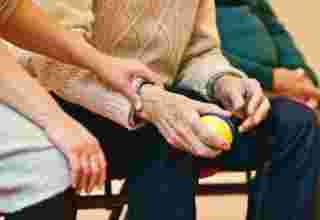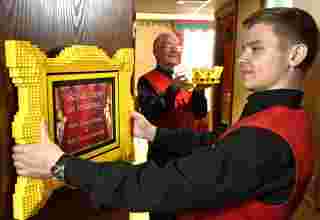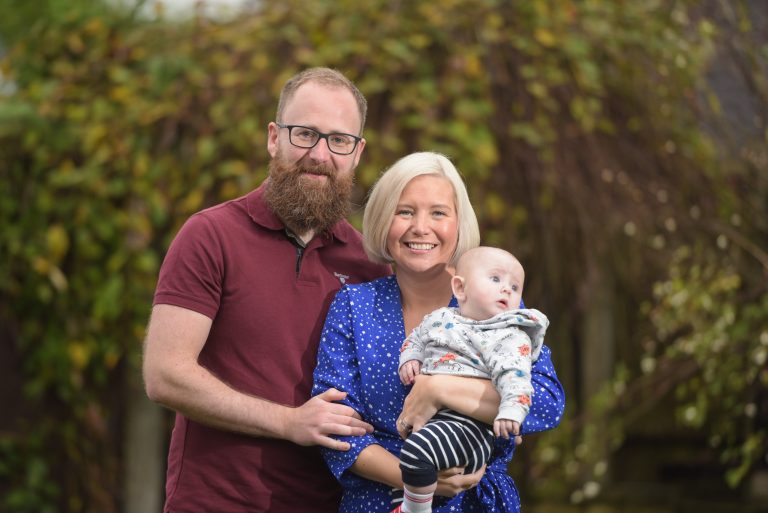
— WITH PICTURES
A couple who tried for a baby for SEVEN years were finally rewarded with a bouncing baby boy – after experts told them to give up exercise and avoid wearing perfume.
Business owner Nicola Szymanowski, 38, and husband Mark welcomed 6lb 10oz Charles Henry John in May after battling to overcome fertility issues on both sides.
Nicola and Mark, 39, a logistics manager, spent around £20,000 on IVF treatment during an “utterly physically and emotionally exhausting” ordeal.
Along the way Nicola, who for long spells spent day after day arriving at the hospital for 6.30 am appointments, suffered four unsuccessful IVF courses, and two miscarriages.
It was only after a doctor at IVI Clinic in Tamworth advised the couple to make dramatic changes to their lifestyles including telling Mark to give up his morning boxing sessions and Nicola to avoid perfume that their dreams came true.
Nicola 38, of Bury, Manchester said: ”The doctor said Mark doing strenuous exercise would lead to his body releasing endorphins to repair the muscles, which could affect our chances.
”And she also said chemicals from perfume or make-up would get into my bloodstream, so I stopped using perfume.
”I even asked people who were coming to see me not to wear perfume.
”It was an horrific journey, absolutely horrific. There were times when we were so low.
”But we finally got what we wanted.
”We were overjoyed when Charles arrived. We were very fortunate that Mark’s parents and my parents and step parents helped us out with the bill.
”Without them it wouldn’t have been possible.”
Mark added: “Surprisingly it was more difficult to give up exercise than it was boxing! However, it’s not great to be able to do both.”
Nicola and Mark’s story emerged as part of National Fertility Awareness Week (NFAW) which takes place this week (30th Oct to 5th Nov).
This year celebrates the 40th anniversary of the first ever baby conceived using IVF, and over 250,000 healthy IVF babies have been born in the UK since.
With as many as one in seven couples having trouble conceiving, Fertility Network and IVI UK wanted to give a voice to these experiences.
The couple decided they wanted a family shortly after they met in September 2008, but despite their best efforts Nicola didn’t fall pregnant.
In late 2011, the couple from Bury in Manchester visited their visited their local GP for a check-up and were referred to St Mary’s hospital in Manchester where Mark was told he had a low sperm count.
Subsequently they found out Nicola had a low egg reserve and a high FSH.
After postponing baby plans in the lead up to their wedding in 2012, the couple began to try again on their honeymoon in April 2013.
Four months later they were accepted into the fertility unit of St Mary’s to begin the gruelling treatment which involved Nicola injecting herself daily.
With daily 6:30am visits to the unit, an hour away from her home, Nicola had blood samples taken and tests to see if her follicles had grown to the required 16 to 17mm length.
Having been put on the ‘long protocol’, Nicola grew four follicles and at the end of the treatment went back in to have the eggs retrieved.
Nicola had produced four eggs and was then sent home overnight where she anxiously waited to hear how many had survived.
Doctors called Nicola to notify her one had made it.
She travelled back to have it implanted and then endured the ‘dreaded two week wait’, praying the eggs would stick.
On Christmas Eve 2013, a pregnancy test proved to be positive.
Nicola and Mark then went for a hospital check-up 13 days later and were devastated when no heartbeat was found.
A ‘removal’ was carried out four days later, where they discovered the loss of identical twins.
Amid their traumatic start to 2014, Nicola’s grandad had cancer which had worsened.
During a holiday in Mexico in March 2014, Nicola realised her period was late.
Aware it is common to fall pregnant naturally after a bout of IVF treatment, a pregnancy test revealed a positive result.
Their cautious happiness was tempered by the death of grandad Ken.
The day before grandad Ken’s funeral, Nicola experienced bleeding and drive to St Mary’s to be told she had miscarried.
In February 2015, a friend recommended seeking advice from Dr Gillian Lockwood at IVI Midland.
A number lifestyle changes were advised for the couple including cutting out caffeine, refined sugar, alcohol and only eating one carb a day.
Mark was advised to stop all exercise including his morning boxing sessions and Nicola was told not to wear perfume.
Dr Gillian also advised Nicola to request a ‘short protocol’ treatment at St Mary’s instead of the long one she was on previously.
Following another two weeks of daily injections and check-ups an hour’s drive away, Nicola produced three eggs, two of which survived.
After another two week wait, a pregnancy test proved negative.
After this point, the couple couldn’t face going back to St Mary’s and gave Dr Gillian’s clinic a try.
Despite taking on the expert’s lifestyle guidance and another course of IVF in June 2015, none of Nicola’s three eggs survived long enough.
As Nicola and Mark struggled to come to terms with the crushing disappointment Dr Gillian put her on a string of steroids.
In a last-ditch attempt, and having racked up the staggering bill, Nicola underwent another course and managed to produce three eggs.
Two survived overnight and one perfectly formed eight cell egg was implanted.
After a couple more days, a fragmented egg was good enough to freeze for a later date.
Sadly, a negative pregnancy test proved the well-formed egg didn’t take.
This resulted in the frozen egg being implanted in September 2016.
A fortnight later, a pregnancy test proved positive and in May 2017 Charles Henry John was born by C-section at St Mary’s hospital.
Nicola said: “’Without IVF we wouldn’t have our family. Science is amazing. The whole process was totally and utterly physically and emotionally exhausting.
‘’We had some really rough times, there were times when I couldn’t speak to people, and times when I couldn’t get out of bed.
‘’But now Charlie is here. He is beautifully a mixture of Mark and I, and is doing well.”
Discussing NFAW, Dr Gillian Lockwood, Consultant and Executive Director at IVI Midland, said: “It is a pleasure to be part National Fertility Awareness Week, helping to celebrate the 40-year anniversary of pivotal advancements in IVF. IVI Midland was the clinic that welcomed the first baby born in the UK from a frozen egg, and the first baby born from a vitrified egg and so we’re keen to continue supporting UK IVF advancements. “
Nicola runs a Twitter account offering support to people going through IVF and infertility. You can follow her @everydayIVF.
ENDS
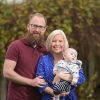
5 month old Charlie Szymanowski was born after the fifth attempt at IVF by parents Nicola, 38, and Mark, 39, who had been trying for a baby for seven years, pictured at home in Bury, Lancs., October 28 2017. See SWNS story SWIVF: A couple who tried for a baby for SEVEN years were finally rewarded with a bouncing baby boy – after experts told them to give up exercise and avoid wearing perfume. Business owner Nicola Szymanowski, 38, and husband Mark welcomed 6lb 10oz Charles Henry John in May after battling to overcome fertility issues on both sides. Nicola and Mark, 39, a logistics manager, spent around £20,000 on IVF treatment during an “utterly physically and emotionally exhausting” ordeal. Along the way Nicola, who for long spells spent day after day arriving at the hospital for 6.30 am appointments, suffered four unsuccessful IVF courses, and two miscarriages. It was only after a doctor at IVI Clinic in Tamworth advised the couple to make dramatic changes to their lifestyles including telling Mark to give up his morning boxing sessions and Nicola to avoid perfume that their dreams came true.
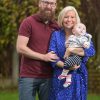
5 month old Charlie Szymanowski was born after the fifth attempt at IVF by parents Nicola, 38, and Mark, 39, who had been trying for a baby for seven years, pictured at home in Bury, Lancs., October 28 2017. See SWNS story SWIVF: A couple who tried for a baby for SEVEN years were finally rewarded with a bouncing baby boy – after experts told them to give up exercise and avoid wearing perfume. Business owner Nicola Szymanowski, 38, and husband Mark welcomed 6lb 10oz Charles Henry John in May after battling to overcome fertility issues on both sides. Nicola and Mark, 39, a logistics manager, spent around £20,000 on IVF treatment during an “utterly physically and emotionally exhausting” ordeal. Along the way Nicola, who for long spells spent day after day arriving at the hospital for 6.30 am appointments, suffered four unsuccessful IVF courses, and two miscarriages. It was only after a doctor at IVI Clinic in Tamworth advised the couple to make dramatic changes to their lifestyles including telling Mark to give up his morning boxing sessions and Nicola to avoid perfume that their dreams came true.
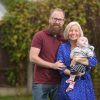
5 month old Charlie Szymanowski was born after the fifth attempt at IVF by parents Nicola, 38, and Mark, 39, who had been trying for a baby for seven years, pictured at home in Bury, Lancs., October 28 2017. See SWNS story SWIVF: A couple who tried for a baby for SEVEN years were finally rewarded with a bouncing baby boy – after experts told them to give up exercise and avoid wearing perfume. Business owner Nicola Szymanowski, 38, and husband Mark welcomed 6lb 10oz Charles Henry John in May after battling to overcome fertility issues on both sides. Nicola and Mark, 39, a logistics manager, spent around £20,000 on IVF treatment during an “utterly physically and emotionally exhausting” ordeal. Along the way Nicola, who for long spells spent day after day arriving at the hospital for 6.30 am appointments, suffered four unsuccessful IVF courses, and two miscarriages. It was only after a doctor at IVI Clinic in Tamworth advised the couple to make dramatic changes to their lifestyles including telling Mark to give up his morning boxing sessions and Nicola to avoid perfume that their dreams came true.
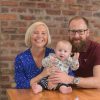
5 month old Charlie Szymanowski was born after the fifth attempt at IVF by parents Nicola, 38, and Mark, 39, who had been trying for a baby for seven years, pictured at home in Bury, Lancs., October 28 2017. See SWNS story SWIVF: A couple who tried for a baby for SEVEN years were finally rewarded with a bouncing baby boy – after experts told them to give up exercise and avoid wearing perfume. Business owner Nicola Szymanowski, 38, and husband Mark welcomed 6lb 10oz Charles Henry John in May after battling to overcome fertility issues on both sides. Nicola and Mark, 39, a logistics manager, spent around £20,000 on IVF treatment during an “utterly physically and emotionally exhausting” ordeal. Along the way Nicola, who for long spells spent day after day arriving at the hospital for 6.30 am appointments, suffered four unsuccessful IVF courses, and two miscarriages. It was only after a doctor at IVI Clinic in Tamworth advised the couple to make dramatic changes to their lifestyles including telling Mark to give up his morning boxing sessions and Nicola to avoid perfume that their dreams came true.
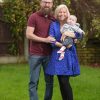
5 month old Charlie Szymanowski was born after the fifth attempt at IVF by parents Nicola, 38, and Mark, 39, who had been trying for a baby for seven years, pictured at home in Bury, Lancs., October 28 2017. See SWNS story SWIVF: A couple who tried for a baby for SEVEN years were finally rewarded with a bouncing baby boy – after experts told them to give up exercise and avoid wearing perfume. Business owner Nicola Szymanowski, 38, and husband Mark welcomed 6lb 10oz Charles Henry John in May after battling to overcome fertility issues on both sides. Nicola and Mark, 39, a logistics manager, spent around £20,000 on IVF treatment during an “utterly physically and emotionally exhausting” ordeal. Along the way Nicola, who for long spells spent day after day arriving at the hospital for 6.30 am appointments, suffered four unsuccessful IVF courses, and two miscarriages. It was only after a doctor at IVI Clinic in Tamworth advised the couple to make dramatic changes to their lifestyles including telling Mark to give up his morning boxing sessions and Nicola to avoid perfume that their dreams came true.
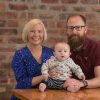
5 month old Charlie Szymanowski was born after the fifth attempt at IVF by parents Nicola, 38, and Mark, 39, who had been trying for a baby for seven years, pictured at home in Bury, Lancs., October 28 2017. See SWNS story SWIVF: A couple who tried for a baby for SEVEN years were finally rewarded with a bouncing baby boy – after experts told them to give up exercise and avoid wearing perfume. Business owner Nicola Szymanowski, 38, and husband Mark welcomed 6lb 10oz Charles Henry John in May after battling to overcome fertility issues on both sides. Nicola and Mark, 39, a logistics manager, spent around £20,000 on IVF treatment during an “utterly physically and emotionally exhausting” ordeal. Along the way Nicola, who for long spells spent day after day arriving at the hospital for 6.30 am appointments, suffered four unsuccessful IVF courses, and two miscarriages. It was only after a doctor at IVI Clinic in Tamworth advised the couple to make dramatic changes to their lifestyles including telling Mark to give up his morning boxing sessions and Nicola to avoid perfume that their dreams came true.
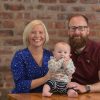
5 month old Charlie Szymanowski was born after the fifth attempt at IVF by parents Nicola, 38, and Mark, 39, who had been trying for a baby for seven years, pictured at home in Bury, Lancs., October 28 2017. See SWNS story SWIVF: A couple who tried for a baby for SEVEN years were finally rewarded with a bouncing baby boy – after experts told them to give up exercise and avoid wearing perfume. Business owner Nicola Szymanowski, 38, and husband Mark welcomed 6lb 10oz Charles Henry John in May after battling to overcome fertility issues on both sides. Nicola and Mark, 39, a logistics manager, spent around £20,000 on IVF treatment during an “utterly physically and emotionally exhausting” ordeal. Along the way Nicola, who for long spells spent day after day arriving at the hospital for 6.30 am appointments, suffered four unsuccessful IVF courses, and two miscarriages. It was only after a doctor at IVI Clinic in Tamworth advised the couple to make dramatic changes to their lifestyles including telling Mark to give up his morning boxing sessions and Nicola to avoid perfume that their dreams came true.
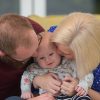
5 month old Charlie Szymanowski was born after the fifth attempt at IVF by parents Nicola, 38, and Mark, 39, who had been trying for a baby for seven years, pictured at home in Bury, Lancs., October 28 2017. See SWNS story SWIVF: A couple who tried for a baby for SEVEN years were finally rewarded with a bouncing baby boy – after experts told them to give up exercise and avoid wearing perfume. Business owner Nicola Szymanowski, 38, and husband Mark welcomed 6lb 10oz Charles Henry John in May after battling to overcome fertility issues on both sides. Nicola and Mark, 39, a logistics manager, spent around £20,000 on IVF treatment during an “utterly physically and emotionally exhausting” ordeal. Along the way Nicola, who for long spells spent day after day arriving at the hospital for 6.30 am appointments, suffered four unsuccessful IVF courses, and two miscarriages. It was only after a doctor at IVI Clinic in Tamworth advised the couple to make dramatic changes to their lifestyles including telling Mark to give up his morning boxing sessions and Nicola to avoid perfume that their dreams came true.
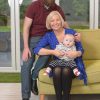
5 month old Charlie Szymanowski was born after the fifth attempt at IVF by parents Nicola, 38, and Mark, 39, who had been trying for a baby for seven years, pictured at home in Bury, Lancs., October 28 2017. See SWNS story SWIVF: A couple who tried for a baby for SEVEN years were finally rewarded with a bouncing baby boy – after experts told them to give up exercise and avoid wearing perfume. Business owner Nicola Szymanowski, 38, and husband Mark welcomed 6lb 10oz Charles Henry John in May after battling to overcome fertility issues on both sides. Nicola and Mark, 39, a logistics manager, spent around £20,000 on IVF treatment during an “utterly physically and emotionally exhausting” ordeal. Along the way Nicola, who for long spells spent day after day arriving at the hospital for 6.30 am appointments, suffered four unsuccessful IVF courses, and two miscarriages. It was only after a doctor at IVI Clinic in Tamworth advised the couple to make dramatic changes to their lifestyles including telling Mark to give up his morning boxing sessions and Nicola to avoid perfume that their dreams came true.
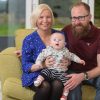
5 month old Charlie Szymanowski was born after the fifth attempt at IVF by parents Nicola, 38, and Mark, 39, who had been trying for a baby for seven years, pictured at home in Bury, Lancs., October 28 2017. See SWNS story SWIVF: A couple who tried for a baby for SEVEN years were finally rewarded with a bouncing baby boy – after experts told them to give up exercise and avoid wearing perfume. Business owner Nicola Szymanowski, 38, and husband Mark welcomed 6lb 10oz Charles Henry John in May after battling to overcome fertility issues on both sides. Nicola and Mark, 39, a logistics manager, spent around £20,000 on IVF treatment during an “utterly physically and emotionally exhausting” ordeal. Along the way Nicola, who for long spells spent day after day arriving at the hospital for 6.30 am appointments, suffered four unsuccessful IVF courses, and two miscarriages. It was only after a doctor at IVI Clinic in Tamworth advised the couple to make dramatic changes to their lifestyles including telling Mark to give up his morning boxing sessions and Nicola to avoid perfume that their dreams came true.
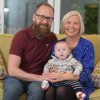
5 month old Charlie Szymanowski was born after the fifth attempt at IVF by parents Nicola, 38, and Mark, 39, who had been trying for a baby for seven years, pictured at home in Bury, Lancs., October 28 2017. See SWNS story SWIVF: A couple who tried for a baby for SEVEN years were finally rewarded with a bouncing baby boy – after experts told them to give up exercise and avoid wearing perfume. Business owner Nicola Szymanowski, 38, and husband Mark welcomed 6lb 10oz Charles Henry John in May after battling to overcome fertility issues on both sides. Nicola and Mark, 39, a logistics manager, spent around £20,000 on IVF treatment during an “utterly physically and emotionally exhausting” ordeal. Along the way Nicola, who for long spells spent day after day arriving at the hospital for 6.30 am appointments, suffered four unsuccessful IVF courses, and two miscarriages. It was only after a doctor at IVI Clinic in Tamworth advised the couple to make dramatic changes to their lifestyles including telling Mark to give up his morning boxing sessions and Nicola to avoid perfume that their dreams came true.
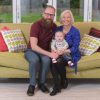
5 month old Charlie Szymanowski was born after the fifth attempt at IVF by parents Nicola, 38, and Mark, 39, who had been trying for a baby for seven years, pictured at home in Bury, Lancs., October 28 2017. See SWNS story SWIVF: A couple who tried for a baby for SEVEN years were finally rewarded with a bouncing baby boy – after experts told them to give up exercise and avoid wearing perfume. Business owner Nicola Szymanowski, 38, and husband Mark welcomed 6lb 10oz Charles Henry John in May after battling to overcome fertility issues on both sides. Nicola and Mark, 39, a logistics manager, spent around £20,000 on IVF treatment during an “utterly physically and emotionally exhausting” ordeal. Along the way Nicola, who for long spells spent day after day arriving at the hospital for 6.30 am appointments, suffered four unsuccessful IVF courses, and two miscarriages. It was only after a doctor at IVI Clinic in Tamworth advised the couple to make dramatic changes to their lifestyles including telling Mark to give up his morning boxing sessions and Nicola to avoid perfume that their dreams came true.
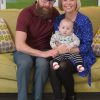
5 month old Charlie Szymanowski was born after the fifth attempt at IVF by parents Nicola, 38, and Mark, 39, who had been trying for a baby for seven years, pictured at home in Bury, Lancs., October 28 2017. See SWNS story SWIVF: A couple who tried for a baby for SEVEN years were finally rewarded with a bouncing baby boy – after experts told them to give up exercise and avoid wearing perfume. Business owner Nicola Szymanowski, 38, and husband Mark welcomed 6lb 10oz Charles Henry John in May after battling to overcome fertility issues on both sides. Nicola and Mark, 39, a logistics manager, spent around £20,000 on IVF treatment during an “utterly physically and emotionally exhausting” ordeal. Along the way Nicola, who for long spells spent day after day arriving at the hospital for 6.30 am appointments, suffered four unsuccessful IVF courses, and two miscarriages. It was only after a doctor at IVI Clinic in Tamworth advised the couple to make dramatic changes to their lifestyles including telling Mark to give up his morning boxing sessions and Nicola to avoid perfume that their dreams came true.
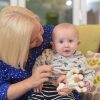
5 month old Charlie Szymanowski was born after the fifth attempt at IVF by parents Nicola, 38, and Mark, 39, who had been trying for a baby for seven years, pictured at home in Bury, Lancs., October 28 2017. See SWNS story SWIVF: A couple who tried for a baby for SEVEN years were finally rewarded with a bouncing baby boy – after experts told them to give up exercise and avoid wearing perfume. Business owner Nicola Szymanowski, 38, and husband Mark welcomed 6lb 10oz Charles Henry John in May after battling to overcome fertility issues on both sides. Nicola and Mark, 39, a logistics manager, spent around £20,000 on IVF treatment during an “utterly physically and emotionally exhausting” ordeal. Along the way Nicola, who for long spells spent day after day arriving at the hospital for 6.30 am appointments, suffered four unsuccessful IVF courses, and two miscarriages. It was only after a doctor at IVI Clinic in Tamworth advised the couple to make dramatic changes to their lifestyles including telling Mark to give up his morning boxing sessions and Nicola to avoid perfume that their dreams came true.
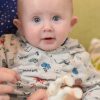
5 month old Charlie Szymanowski was born after the fifth attempt at IVF by parents Nicola, 38, and Mark, 39, who had been trying for a baby for seven years, pictured at home in Bury, Lancs., October 28 2017. See SWNS story SWIVF: A couple who tried for a baby for SEVEN years were finally rewarded with a bouncing baby boy – after experts told them to give up exercise and avoid wearing perfume. Business owner Nicola Szymanowski, 38, and husband Mark welcomed 6lb 10oz Charles Henry John in May after battling to overcome fertility issues on both sides. Nicola and Mark, 39, a logistics manager, spent around £20,000 on IVF treatment during an “utterly physically and emotionally exhausting” ordeal. Along the way Nicola, who for long spells spent day after day arriving at the hospital for 6.30 am appointments, suffered four unsuccessful IVF courses, and two miscarriages. It was only after a doctor at IVI Clinic in Tamworth advised the couple to make dramatic changes to their lifestyles including telling Mark to give up his morning boxing sessions and Nicola to avoid perfume that their dreams came true.

5 month old Charlie Szymanowski was born after the fifth attempt at IVF by parents Nicola, 38, and Mark, 39, who had been trying for a baby for seven years, pictured at home in Bury, Lancs., October 28 2017. See SWNS story SWIVF: A couple who tried for a baby for SEVEN years were finally rewarded with a bouncing baby boy – after experts told them to give up exercise and avoid wearing perfume. Business owner Nicola Szymanowski, 38, and husband Mark welcomed 6lb 10oz Charles Henry John in May after battling to overcome fertility issues on both sides. Nicola and Mark, 39, a logistics manager, spent around £20,000 on IVF treatment during an “utterly physically and emotionally exhausting” ordeal. Along the way Nicola, who for long spells spent day after day arriving at the hospital for 6.30 am appointments, suffered four unsuccessful IVF courses, and two miscarriages. It was only after a doctor at IVI Clinic in Tamworth advised the couple to make dramatic changes to their lifestyles including telling Mark to give up his morning boxing sessions and Nicola to avoid perfume that their dreams came true.
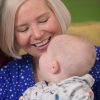
5 month old Charlie Szymanowski was born after the fifth attempt at IVF by parents Nicola, 38, and Mark, 39, who had been trying for a baby for seven years, pictured at home in Bury, Lancs., October 28 2017. See SWNS story SWIVF: A couple who tried for a baby for SEVEN years were finally rewarded with a bouncing baby boy – after experts told them to give up exercise and avoid wearing perfume. Business owner Nicola Szymanowski, 38, and husband Mark welcomed 6lb 10oz Charles Henry John in May after battling to overcome fertility issues on both sides. Nicola and Mark, 39, a logistics manager, spent around £20,000 on IVF treatment during an “utterly physically and emotionally exhausting” ordeal. Along the way Nicola, who for long spells spent day after day arriving at the hospital for 6.30 am appointments, suffered four unsuccessful IVF courses, and two miscarriages. It was only after a doctor at IVI Clinic in Tamworth advised the couple to make dramatic changes to their lifestyles including telling Mark to give up his morning boxing sessions and Nicola to avoid perfume that their dreams came true.
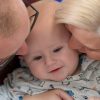
5 month old Charlie Szymanowski was born after the fifth attempt at IVF by parents Nicola, 38, and Mark, 39, who had been trying for a baby for seven years, pictured at home in Bury, Lancs., October 28 2017. See SWNS story SWIVF: A couple who tried for a baby for SEVEN years were finally rewarded with a bouncing baby boy – after experts told them to give up exercise and avoid wearing perfume. Business owner Nicola Szymanowski, 38, and husband Mark welcomed 6lb 10oz Charles Henry John in May after battling to overcome fertility issues on both sides. Nicola and Mark, 39, a logistics manager, spent around £20,000 on IVF treatment during an “utterly physically and emotionally exhausting” ordeal. Along the way Nicola, who for long spells spent day after day arriving at the hospital for 6.30 am appointments, suffered four unsuccessful IVF courses, and two miscarriages. It was only after a doctor at IVI Clinic in Tamworth advised the couple to make dramatic changes to their lifestyles including telling Mark to give up his morning boxing sessions and Nicola to avoid perfume that their dreams came true.
jQuery(document).ready(function($) {
// We only want these styles applied when javascript is enabled
$(‘.gal_content’).css(‘display’, ‘block’);
// Initialize Advanced Galleriffic Gallery
var gallery = $(‘#thumbs_23061_1’).galleriffic({
delay: 3500,
numThumbs: 12,
preloadAhead: 12,
enableTopPager: false,
enableBottomPager: false,
imageContainerSel: ‘#slideshow_23061_1’,
controlsContainerSel: ‘#controls_23061_1’,
captionContainerSel: ‘#caption_23061_1’,
loadingContainerSel: ‘#loading_23061_1’,
renderSSControls: true,
renderNavControls: false,
playLinkText: ‘Play Slideshow’,
pauseLinkText: ‘Pause Slideshow’,
enableHistory: 0,
autoStart: 0,
enableKeyboardNavigation: true,
syncTransitions: false,
defaultTransitionDuration: 300,
onTransitionOut: function(slide, caption, isSync, callback) {
slide.fadeTo(this.getDefaultTransitionDuration(isSync), 0.0, callback);
caption.fadeTo(this.getDefaultTransitionDuration(isSync), 0.0);
},
onTransitionIn: function(slide, caption, isSync) {
var duration = this.getDefaultTransitionDuration(isSync);
slide.fadeTo(duration, 1.0);
// Position the caption at the bottom of the image and set its opacity
var slideImage = slide.find(‘img’);
caption.fadeTo(duration, 1.0);
},
onPageTransitionOut: function(callback) {
//this.hide();
setTimeout(callback, 100); // wait a bit
},
onPageTransitionIn: function() {
var prevPageLink = this.find(‘a.prev’).css({‘opacity’: ‘0.3’ , ‘display’ : ‘inline-block’, ‘cursor’ : ‘default’});
var nextPageLink = this.find(‘a.next’).css({‘opacity’: ‘0.3’ , ‘display’ : ‘inline-block’, ‘cursor’ : ‘default’});
// Show appropriate next / prev page links
if (this.displayedPage > 0)
prevPageLink.css({‘opacity’ : ‘1’ , ‘display’ : ‘inline-block’, ‘cursor’ : ‘pointer’});
var lastPage = this.getNumPages() – 1;
if (this.displayedPage < lastPage)
nextPageLink.css({'opacity' : '1' , 'display' : 'inline-block', 'cursor' : 'pointer'});
this.fadeTo('fast', 1.0);
}
});
/**************** Event handlers for custom next / prev page links **********************/
gallery.find('a.prev').click(function(e) {
gallery.previousPage();
e.preventDefault();
});
gallery.find('a.next').click(function(e) {
gallery.nextPage();
e.preventDefault();
});
});






